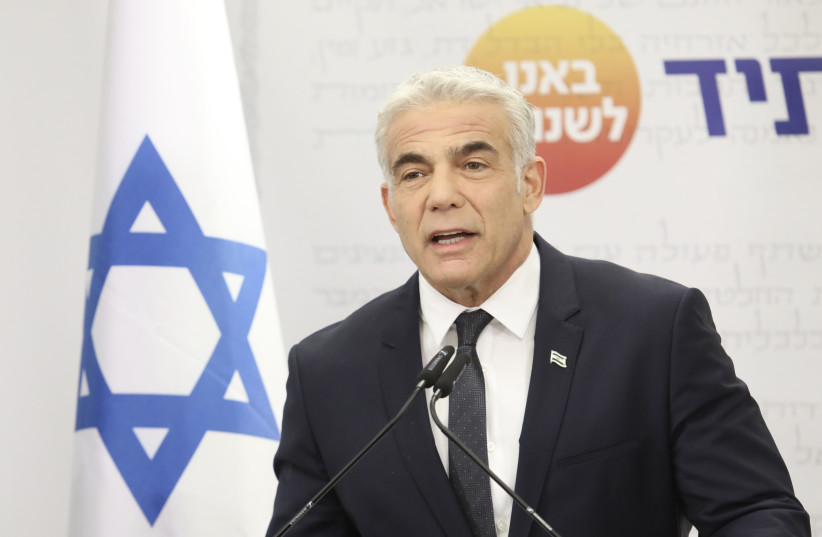Israel is cracking down on violence against Palestinians, but the incidents should not be used to stain the entire State of Israel, Foreign Minister Yair Lapid wrote in a letter to Jewish organizations complaining about the events.
“I have spoken out against extremist violence and will continue to do so,” Lapid wrote on Sunday. “It is anathema to our values, beliefs and way of life.”
Lapid said Israel is “clear and unequivocal” in condemning violence against our values, and “we should not allow them to be abused to tarnish the entire State of Israel or to be manipulated by those who seek to delegitimize the State of Israel.”
He pointed out that the perpetrators of the recent attacks on Palestinians and activists supporting them are “a small extremist minority of the Jewish community in the West Bank,” and that he, Prime Minister Naftali Bennett, Defense Minister Benny Gantz and other leading figures have condemned them.
“Israel is a law-abiding democracy,” the letter continues. “The government is committed to cracking down on acts of violence wherever they occur and on whoever is committing them.”

The Defense and Public Security ministries are working together to bring the perpetrators to justice, Lapid added.
The letter was written a day before a Security Cabinet meeting on the matter, in which the IDF and Public Security Ministry argued over who has the authority to arrest Israeli attackers; the former said only the police, while the latter said both do.
The foreign minister ended the letter by thanking the organizations for their support and inviting them back.
Lapid wrote the letter in response to one from the Anti-Defamation League, Central Conference of American Rabbis, Israel Policy Forum, National Council of Jewish Women, Rabbinical Assembly, Union for Reform Judaism and United Synagogue of Conservative Judaism condemning the attacks by extremists. The letter was also sent to Bennett.
“We urge the entire Israeli government to unite in strong condemnation against these acts, to work decisively to hold those responsible accountable and to confront the growing threats posed by these extremists with the determination and seriousness that this grave situation requires,” the seven organizations wrote.
The violent incidents damage Israel’s “image and relations with the United States government, American people, and American Jewry,” and Israeli democracy, the letter states.
In an interview with The Jerusalem Post last week, Bennett said he “totally condemn[s] all violence, certainly by Jews.”
Bennett said he convened the head of the Shin Bet (Israel Security Agency) and the IDF chief of staff for a meeting in December and called on them to use all the tools necessary to put an end to this violence.
“In my view, this violence by Jews, which does not reflect the half-million normative Israeli citizens in Judea and Samaria, is shameful, and whoever does it wants to dismantle Israeli statehood,” Bennett stated.
“They are saying there is no law and order; we set the law; there is no army or police,” he said. “That’s not why we established a state. We are a state of laws; I will not allow this to continue. We will act against pockets of lawlessness in the Negev, in Judea and Samaria – everywhere.”
